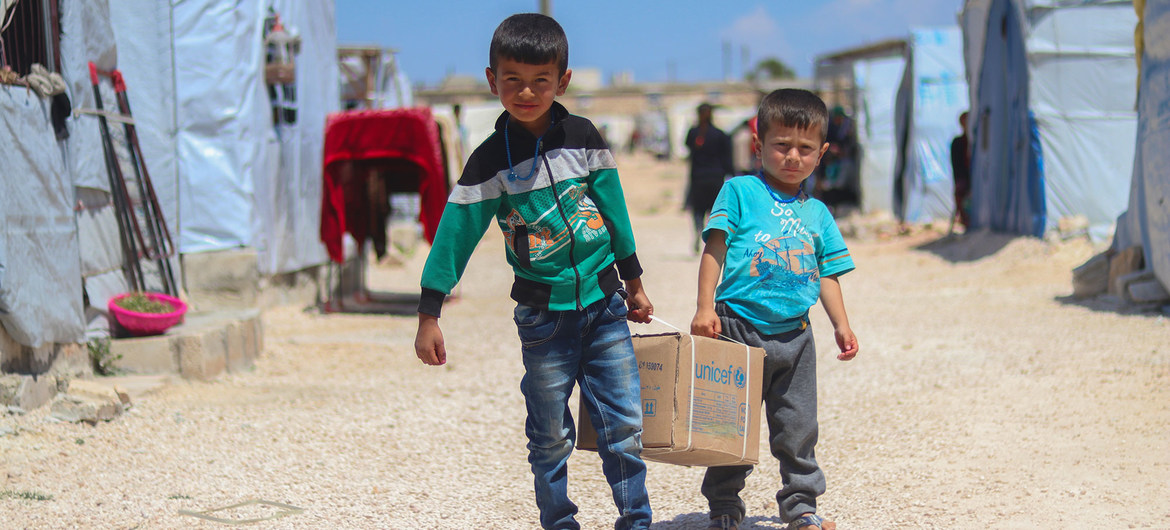
A Security Council resolution that allowed the UN to deliver humanitarian aid across Turkey’s border into northwest Syria without President Bashar al-Assad’s permission expired on July 10, as diplomats failed to come to a deal in the face of a Russian veto. Russia, which has long opposed the cross-border aid operation as an affront to Syrian sovereignty, used its veto to stop a one-year renewal on July 8. Its own proposal for a six-month extension was voted down by the United States, Britain, and France. While negotiations continued through the weekend on a compromise, there was no vote by the resolution’s end date, the 10th.
The UN estimates that more than 4 million people live in the rebel-held northwest, which includes Idlib province and its surroundings. Many have been forced to flee their homes multiple times. Around 1.7 million are living in camps, without employment opportunities, and the vast majority of people are forced to depend on aid. According to the UN’s statistics, it delivers (along with NGO partners) food, vaccines, and other aid to 2.4 million people a month. A UN source has said that some one million people could lose food aid if the UN is forced to pull out of the region.
A group of Syrian and international NGOs working in the northwest condemned “in the strongest terms” the failure to renew the resolution. “Members of the UN Security Council have put politics ahead of the lives of Syrian civilians, most of them children and women, who are in urgent need of life-saving assistance,” it said in a statement. “There is simply no justification for restricting aid to Syrians at a time when humanitarian needs are at their height… The job of the Security Council is to protect civilians, not to be the direct cause of suffering and loss of life.”
The expiration doesn’t necessarily mean the end of UN aid to the region. The Security Council also failed to agree on the issue before a deadline in July 2020, despite multiple proposals and votes. On that occasion, diplomats found a compromise solution the day after the resolution expired that reduced the number of border crossings the UN could use to one—Bab al-Hawa, which is now the subject of debate.
While the UN and the NGOs it works with constitute a major provider of assistance to the northwest, other aid groups do operate in the region, including the Turkish Red Crescent, and there has been some contingency planning for a UN withdrawal. However, the UN and many other aid organizations say the role it plays in coordination, logistics, and procurement of aid will be extremely difficult to replace, at least in the short term.
Annie Slemrod for The New Humanitarian, July 11
Note: Aid workers in the region are warning of imminent “famine” in northern Syria in the wake of the resolution expiration, which coincided with the Eid al-Adha holiday. (AFP, MEE) Russia’s proposed resolution would have kept the route open for six months and then given control over aid deliveries to Assad’s government. (NYT) This appears to be predicated on the assumption that the last rebel-held pockets in Idlib and elsewhere in the north will be retaken by the regime over the next six months. The Assad regime is accused of denying aid to besieged rebel-held enclaves.
Photo: UNICEF via UN News





Syria aid access extended by six months
The UN Security Council approved a resolution July 12 extending humanitarian aid deliveries to 4.1 million people in Syria’s rebel-held northwest for just six months, in a compromise with Russia. The vote was 12-0 with the US, UK and France abstaining. The three veto-wielding council members had backed a resolution for a year-long extension that was supported by almost the entire 15-member council but vetoed by Russia on July 8. The compromise resolution was sponsored Ireland and Norway. (AP)
Syria aid access extended by another six months
The UN Security Council unanimously decided today to extend the use of the Bab al-Hawa border crossing for the delivery of aid into north-west Syria until July 10, 2023. The Council also requested the Secretary-General to provide a special report on humanitarian needs in Syria no later than June 10. (UNSC)